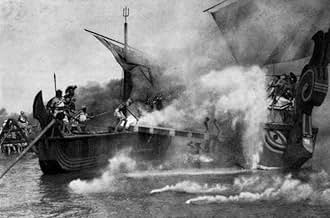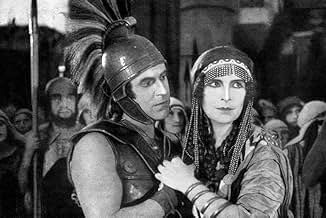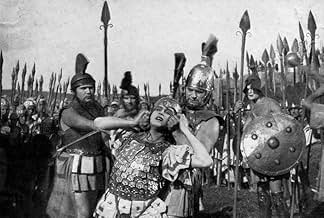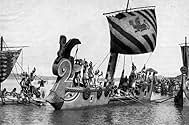Füge eine Handlung in deiner Sprache hinzuHelena is a 1924 German silent drama film directed by Manfred Noa and starring Edy Darclea, Vladimir Gajdarov and Albert Steinrück.Helena is a 1924 German silent drama film directed by Manfred Noa and starring Edy Darclea, Vladimir Gajdarov and Albert Steinrück.Helena is a 1924 German silent drama film directed by Manfred Noa and starring Edy Darclea, Vladimir Gajdarov and Albert Steinrück.
Friedrich Ulmer
- Menelaos
- (as Fritz Ulmer)
Karel Lamac
- Patroklos
- (as Carl Lamac)
Rudolf Meinhard-Jünger
- Tersites
- (as Rudolph Meinhard)
Empfohlene Bewertungen
One of the most ambitious epics to be made during the silent movie era but one of the most ignored was January 1924's "Helena," directed by Manfred Noa. The reason for this two-part, three-plus hour extravaganza being neglected in the annals of movie history was partly because its production expenditures almost bankrupted one of Germany's largest film studios, Munich's Bavaria Film. The other is after its worldwide distribution and subsequent showings into the 1930s, all the prints of this mammoth motion picture disappeared.
A print emerged in 1999 in a movie archive house in Lausanne, Switzerland, casting a light on Noa's 'masterpiece.' Split into two parts, 'The Rape of Helen' and 'The Fall of Troy,' "Helena" was partly based on Homer's 'The Iliad' as well as other Greek sources. The production consisted literally a cast of thousands. Up to its release, "Helena's" chariot race was the best at capturing the excitement of the sporting spectacle. The Grecian battles and Trojan Army attacking transport ships docking in Troy was realistic in detail. And when the Trojan Horse was hauled inside the gates of Troy, its enormous size showed the structure was more than big enough to secretly ensconce a load of Grecian soldiers to temporarily take over the city and open the gates to the outside battalions waiting to storm in.
Noa was entrusted in handling such a large budget on the basis of his widely successful 1922 'Nathan the Wise,' which preached religious tolerance in the face of bigotry, especially in the face of increasingly anti-Semitism in Germany after the Great War. Despite its success, 'Nathan the Wise' was greeted by protests in Munich for being too pro-Jewish.
Noa, a film set designer before he was given a chance to direct his first movie in 1916, eventually directed over 40 movies into the early talkie stages. He died of peritonitis in December 1930 at the young age of 37. Once they took over Germany, the Nazis made it a point to erase Noa from the film history books because of his Jewish descent. Fortunately his masterpiece has been restored for future generations to appreciate his handling of an epic few directors are capable of creating.
A print emerged in 1999 in a movie archive house in Lausanne, Switzerland, casting a light on Noa's 'masterpiece.' Split into two parts, 'The Rape of Helen' and 'The Fall of Troy,' "Helena" was partly based on Homer's 'The Iliad' as well as other Greek sources. The production consisted literally a cast of thousands. Up to its release, "Helena's" chariot race was the best at capturing the excitement of the sporting spectacle. The Grecian battles and Trojan Army attacking transport ships docking in Troy was realistic in detail. And when the Trojan Horse was hauled inside the gates of Troy, its enormous size showed the structure was more than big enough to secretly ensconce a load of Grecian soldiers to temporarily take over the city and open the gates to the outside battalions waiting to storm in.
Noa was entrusted in handling such a large budget on the basis of his widely successful 1922 'Nathan the Wise,' which preached religious tolerance in the face of bigotry, especially in the face of increasingly anti-Semitism in Germany after the Great War. Despite its success, 'Nathan the Wise' was greeted by protests in Munich for being too pro-Jewish.
Noa, a film set designer before he was given a chance to direct his first movie in 1916, eventually directed over 40 movies into the early talkie stages. He died of peritonitis in December 1930 at the young age of 37. Once they took over Germany, the Nazis made it a point to erase Noa from the film history books because of his Jewish descent. Fortunately his masterpiece has been restored for future generations to appreciate his handling of an epic few directors are capable of creating.
I saw a recently restored copy at the Cinematheque Suisse at the Cassino de Montbenon, Lausanne, VD, CH. It was a unique session, with a live pianist and some explanations about the history of the movie and its restauration before.
It is a tour de force of 3h20... even with breaks, the occasional involuntarily comical scene, live music and lots of interest, it is tiresome. The Sturm-und-Drag style is heavy, many theatrical conventions of the time don't hold anymore to the point of eliciting laughters from the audience; people are far shorter than in today's movies, and the standards of beauty have changed so much it is difficult to believe.
On the other hand, it is a unique experience of an early superproduction. The take on the famous historical and mythical Homer poem is detailed and enlightening, and thinking about the historical context (as people knew far more mythology during the 1,920s than today) can make the movie more enjoyable. Also some historical knowledge about the 1,920s can help, for example about the role of physioculture in Germany at the time.
It is extremely rare that such a movie will be at the nearest Blockbuster anytime soon. But in case it does, and you have a serious interest in German Sturm-und-Drag, go for it.
It is a tour de force of 3h20... even with breaks, the occasional involuntarily comical scene, live music and lots of interest, it is tiresome. The Sturm-und-Drag style is heavy, many theatrical conventions of the time don't hold anymore to the point of eliciting laughters from the audience; people are far shorter than in today's movies, and the standards of beauty have changed so much it is difficult to believe.
On the other hand, it is a unique experience of an early superproduction. The take on the famous historical and mythical Homer poem is detailed and enlightening, and thinking about the historical context (as people knew far more mythology during the 1,920s than today) can make the movie more enjoyable. Also some historical knowledge about the 1,920s can help, for example about the role of physioculture in Germany at the time.
It is extremely rare that such a movie will be at the nearest Blockbuster anytime soon. But in case it does, and you have a serious interest in German Sturm-und-Drag, go for it.
"Helena; Der Untergang Trojas" (1923/24) is a free adaptation of Homer's work "The Iliad". It was kept practically in oblivion until an almost complete copy was found in Lausanne, Switzerland (that European country so amusing for Teutonic aristocrats). This copy was completed with several materials available from other forgotten copies in the archives of Rome, Madrid and Moscow.
Due to all this material and research, a reconstruction, very close to the original, has been possible. It was made by the "FilmMuseum München". It is another major effort of silent film restoration because in this case they kept the tints used in the original film. All this provided a unique opportunity for the world of silent movie fans to appreciate this German super production after it suffered through 80 years of neglect.
Obscurity was also the fate of the film's director, Herr Manfred Noa; this Teutonic aristocrat did not know much about Herr Noa; although, from time to time, this Herr Graff might have crossed paths with him in some decadent silent soiree Herr Manfred Noa (1893-1930) was originally an architect but then embarked on a short but fruitful career as a director in Berlin.
He started as a set designer in many Germanic productions until he was "discovered" by the great German director Herr Richard Oswald (who directed among others, the unclassifiable and fascinating "Unheimliche Geschichten" (1919) and "Alraune" (1930)). Oswald acted as Herr Noa's mentor and Noa finally had an opportunity to direct his first film "Bobby Als Amor" in 1916.
His meticulous adaptation of Homer's masterpiece brought his production company, Bavarian Films, to bankruptcy and the film was unable to recoup the enormous production costs. It was released at almost the same time as Fritz Lang's "Die Nibelungen" (1924), a great epic that deserves its place of honor in cinema history. However, it is unjust that "Helene", which shares some of the qualities of the Lang film, had such small support from a public who enjoyed these monumental films.
Herr Manfred Noa, was Jewish and had to suffer the anti-Semitism that was so common in Germany at that time. Noa's earlier film "Nathan, Der Weise" (1922), a plea for tolerance between different religions, had to be withdrawn from the cinema because of threats that were made barely a day after its premiere in Munich. Of course the situation was doomed to get worse as the Nazis gained in influence.
Noa died prematurely in 1930 and both his life and his work stayed in oblivion until the recent discovery and excellent restoration of "Helena".
"Helena" is the only German film version of the Troy legend; certainly doing an adaptation of such a work was a very arduous and unenviable task but it was put in the capable hands of playwright Herr Hans Kyser. The movie was divided into two parts, "Der Raub Der Helena" ( The Abduction Of Helen ) and "Der Untergang Trojas" ( The Ruin Of Troy ). It's a titanic, surprising and majestic effort, technically impeccable and with extremely careful production design. The theatricality, magnificent locations, great set design and countless extras naturally bring to mind "Cabiria", that super production that influenced so many, especially Herr Griffith. "Helena" is a big, kolossal film worthy of the adjectives usually heaped upon such an epic. It also has an eye for realistic historical detail and striking costume design (done by Herr Walter Wessener). The film's special effects are outstanding especially in the premonitions and dream sequences which are atmospheric and ingeniously done.
Obviously in this adaptation of Homer's work, special care has to be taken for the big battles and crowds and the hordes of extras, especially when the city of Troy is under siege. The coordination of these elements can be difficult, even for the disciplined German mind.
Not all of the spectacular sequences are as good as they could be; surely the chariot race does not compare to the one in Fred Niblo's "Ben-Hur" (1925). It is actually "static" and without the beauty and emotion of Herr Niblo's excellent film. However, "Helena" makes up for it to some extent in the naval battle where the chaos produced by the ships, smoke and fire manage to recreate perfectly that emotional conflict between Greeks and Trojans.
The film's principal actors, although not very well known, performed their characters in a proper manner, without falling into excessive mannerisms that one sometimes sees in these pioneer productions. It is important to mention Herr Carl de Vogt, one of the biggest German stars of those times who had already performed in four of Herr Fritz Lang's films. He plays Hektor in "Helena".
The film's numerous merits demonstrate the unfairness of "Helena" and its director Herr Manfred Noa being so little known. We have to be grateful for these modern restoration jobs of old nitrates.
And now, if you'll allow me, I must temporarily take my leave because this German Count has just received an agreeable present from the Schloss' servants: a big wooden horse.
Due to all this material and research, a reconstruction, very close to the original, has been possible. It was made by the "FilmMuseum München". It is another major effort of silent film restoration because in this case they kept the tints used in the original film. All this provided a unique opportunity for the world of silent movie fans to appreciate this German super production after it suffered through 80 years of neglect.
Obscurity was also the fate of the film's director, Herr Manfred Noa; this Teutonic aristocrat did not know much about Herr Noa; although, from time to time, this Herr Graff might have crossed paths with him in some decadent silent soiree Herr Manfred Noa (1893-1930) was originally an architect but then embarked on a short but fruitful career as a director in Berlin.
He started as a set designer in many Germanic productions until he was "discovered" by the great German director Herr Richard Oswald (who directed among others, the unclassifiable and fascinating "Unheimliche Geschichten" (1919) and "Alraune" (1930)). Oswald acted as Herr Noa's mentor and Noa finally had an opportunity to direct his first film "Bobby Als Amor" in 1916.
His meticulous adaptation of Homer's masterpiece brought his production company, Bavarian Films, to bankruptcy and the film was unable to recoup the enormous production costs. It was released at almost the same time as Fritz Lang's "Die Nibelungen" (1924), a great epic that deserves its place of honor in cinema history. However, it is unjust that "Helene", which shares some of the qualities of the Lang film, had such small support from a public who enjoyed these monumental films.
Herr Manfred Noa, was Jewish and had to suffer the anti-Semitism that was so common in Germany at that time. Noa's earlier film "Nathan, Der Weise" (1922), a plea for tolerance between different religions, had to be withdrawn from the cinema because of threats that were made barely a day after its premiere in Munich. Of course the situation was doomed to get worse as the Nazis gained in influence.
Noa died prematurely in 1930 and both his life and his work stayed in oblivion until the recent discovery and excellent restoration of "Helena".
"Helena" is the only German film version of the Troy legend; certainly doing an adaptation of such a work was a very arduous and unenviable task but it was put in the capable hands of playwright Herr Hans Kyser. The movie was divided into two parts, "Der Raub Der Helena" ( The Abduction Of Helen ) and "Der Untergang Trojas" ( The Ruin Of Troy ). It's a titanic, surprising and majestic effort, technically impeccable and with extremely careful production design. The theatricality, magnificent locations, great set design and countless extras naturally bring to mind "Cabiria", that super production that influenced so many, especially Herr Griffith. "Helena" is a big, kolossal film worthy of the adjectives usually heaped upon such an epic. It also has an eye for realistic historical detail and striking costume design (done by Herr Walter Wessener). The film's special effects are outstanding especially in the premonitions and dream sequences which are atmospheric and ingeniously done.
Obviously in this adaptation of Homer's work, special care has to be taken for the big battles and crowds and the hordes of extras, especially when the city of Troy is under siege. The coordination of these elements can be difficult, even for the disciplined German mind.
Not all of the spectacular sequences are as good as they could be; surely the chariot race does not compare to the one in Fred Niblo's "Ben-Hur" (1925). It is actually "static" and without the beauty and emotion of Herr Niblo's excellent film. However, "Helena" makes up for it to some extent in the naval battle where the chaos produced by the ships, smoke and fire manage to recreate perfectly that emotional conflict between Greeks and Trojans.
The film's principal actors, although not very well known, performed their characters in a proper manner, without falling into excessive mannerisms that one sometimes sees in these pioneer productions. It is important to mention Herr Carl de Vogt, one of the biggest German stars of those times who had already performed in four of Herr Fritz Lang's films. He plays Hektor in "Helena".
The film's numerous merits demonstrate the unfairness of "Helena" and its director Herr Manfred Noa being so little known. We have to be grateful for these modern restoration jobs of old nitrates.
And now, if you'll allow me, I must temporarily take my leave because this German Count has just received an agreeable present from the Schloss' servants: a big wooden horse.
Wusstest du schon
- WissenswertesFor many years the film was considered partially lost until it was reconstructed from a version found in Swiss archives.
- VerbindungenEdited into Spisok korabley (2008)
Top-Auswahl
Melde dich zum Bewerten an und greife auf die Watchlist für personalisierte Empfehlungen zu.
Details
- Laufzeit3 Stunden 24 Minuten
- Farbe
- Sound-Mix
- Seitenverhältnis
- 1.33 : 1
Zu dieser Seite beitragen
Bearbeitung vorschlagen oder fehlenden Inhalt hinzufügen

































